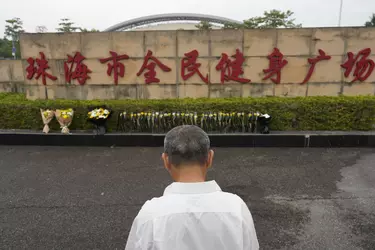
The order came from the top.
China’s leader Xi Jinping wants the recent spree of mass killings that shocked the country not to happen again. He ordered local governments to prevent future “extreme cases.”
The attacks, where drivers mow down people on foot or knife-wielding assailants stab multiple victims, are not new in China. But the latest surge drew attention.
Local officials were quick to vow to examine all sorts of personal disputes that could trigger aggression, from marital troubles to disagreements over inheritance.
However, the increasing reach into people’s private lives raises concerns at a time when the Chinese state has already tightened its grip over all social and political aspects in the East Asian nation.
‘Revenge on Society Crimes’
This is how people in China label these attacks.In November alone, three took place: A man struck people at an elementary school in Hunan province, wounding 30, after suffering investment losses. A student who failed his examination stabbed and killed eight at a vocational school in the city of Yixing. The most victims, 35 people, resulted from a man mowing down a crowd in the southern city of Zhuhai, supposedly upset over his divorce.
While pinpointing the exact motive of such attacks can be difficult, there is an overwhelming feeling of being pressured within Chinese society, experts say.
“On the surface, it seems like there are individual factors, but we see there’s a common link,” Wu Qiang, a former political science professor, said. “This link is, in my personal opinion, every person has a feeling of injustice. They feel deeply that this society is very unfair and they can’t bear it anymore.”
Since 2015, Chinese police have targeted human rights lawyers and non-profit advocacy groups, jailing many, while keeping tight surveillance on others, effectively destroying the civil society that had been active from the early 2000s to 2010s.
Wu was fired from Tsinghua University after conducting fieldwork during the 2014 Occupy protests in Hong Kong. He says police officers have been regularly stationed outside his home in Beijing since last year.
Keeping a tight lid on the killings
A decade ago, media outlets could report an incident as it developed and even share a suspect’s name. Nowadays, it’s rarely possible.During the 24 hours before the death toll was released in the Zhuhai slaying, state censors were quick to remove any videos of the incident and eyewitness accounts shared online. In the case of the Hunan elementary school attack, authorities shared the number of the wounded only after the court sentencing, nearly a month later.
A tally of violent attacks can be documented in other countries; notably, the U.S. had 38 mass killings so far this year, according to an Associated Press database. But in China, a lack of public data makes it hard to decipher mass killing trends.
“From 2000 to 2010, there was a lot of discussions, including how do we help these people by making structural changes to reduce these risks, but now there’s not,” said Rose Luqiu, a well-known former journalist with state-owned Phoenix Television and an associate professor at Hong Kong Baptist University.
Luqiu believes the government may be enforcing censorship thinking it will prevent copycats from imitating such crimes.
“Things will only become more and more strict,” she predicted. For the Chinese state, “the only method to deal with it is to strengthen control.”
Officials vow to ferret out hidden risks
After the Zhuhai attack, Xi called on all local governments “to strengthen prevention and control of risks at the source, strictly prevent extreme cases from occurring, and to resolve conflicts and disputes in a timely manner,” according to the official Xinhua news agency.The AP found at least a dozen local government notices, from small towns to big cities, announcing actions in response.
In eastern Anhui province, a ruling Communist Party leader inspected a middle school, a local police station, and even the warehouse of a chemical factory where he urged the workers to “ferret out any hidden risks.” He said they must “thoroughly and meticulously investigate and resolve conflicts and disputes,” including in families, marriages and neighborhoods.
Police and prosecutors issued similar statements.
The Ministry of Justice promised to curtail conflicts by looking into squabbles over inheritance, housing, land and unpaid wages.
However, many expressed worry over how such disputes will be detected.
“I think we’re at the beginning of a vicious cycle,” said Lynette Ong, a professor at the University of Toronto and author of “Outsourcing Repression: Everyday State Power in Contemporary China.” “If you nip the conflict in its bud, you’d imagine the system then would impose a lot of pressure ... on schools, enterprises and factories.”
The new announcements reminded Ong of China’s strict policies during the COVID-19 pandemic. Neighborhood committees, the lowest rung of government, set up fences and barriers in front of buildings to control entry and exit and broke into homes in extreme cases to disinfect the apartments of people who had caught the virus.
Eventually, people protested en masse.
“If we see non-sensible measures being introduced, you’ll be met by resistance and anger and grievances from the people, and it’s going to feed into this vicious cycle where more extreme measures are going to be brought,” she said.
Article Link
Archive
